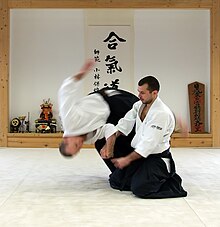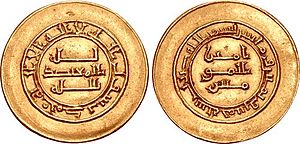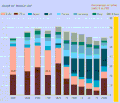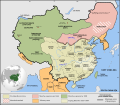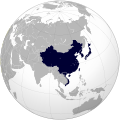Portal:Asia

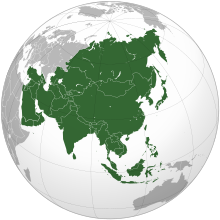 Asia (/ˈeɪʒə/ ⓘ AY-zhə, UK also /ˈeɪʃə/ AY-shə) is the largest continent in the world by both land area and population. It covers an area of more than 44 million square kilometers, about 30% of Earth's total land area and 8% of Earth's total surface area. The continent, which has long been home to the majority of the human population, was the site of many of the first civilizations. Its 4.7 billion people constitute roughly 60% of the world's population. Asia shares the landmass of Eurasia with Europe, and of Afro-Eurasia with both Europe and Africa. In general terms, it is bounded on the east by the Pacific Ocean, on the south by the Indian Ocean, and on the north by the Arctic Ocean. The border of Asia with Europe is a historical and cultural construct, as there is no clear physical and geographical separation between them. It is somewhat arbitrary and has moved since its first conception in classical antiquity. The division of Eurasia into two continents reflects East–West cultural, linguistic, and ethnic differences, some of which vary on a spectrum rather than with a sharp dividing line. A commonly accepted division places Asia to the east of the Suez Canal separating it from Africa; and to the east of the Turkish Straits, the Ural Mountains and Ural River, and to the south of the Caucasus Mountains and the Caspian and Black seas, separating it from Europe. China and India traded places as the largest economies in the world from 1 to 1800 CE. China was a major economic power for much of recorded history, with the highest GDP per capita until 1500. The Silk Road became the main east–west trading route in the Asian hinterlands while the Straits of Malacca stood as a major sea route. Asia has exhibited economic dynamism as well as robust population growth during the 20th century, but overall population growth has since fallen. Asia was the birthplace of most of the world's mainstream religions including Hinduism, Zoroastrianism, Judaism, Jainism, Buddhism, Confucianism, Taoism, Christianity, Islam, Sikhism, as well as many other religions. (Full article...) Featured articleAikido (Shinjitai: 合気道, Kyūjitai: 合氣道, aikidō, Japanese pronunciation: [aikiꜜdoː]) is a modern Japanese martial art that is split into many different styles, including Iwama Ryu, Iwama Shin Shin Aiki Shuren Kai, Shodokan Aikido, Yoshinkan, Renshinkai, Aikikai and Ki Aikido. Aikido is now practiced in around 140 countries. It was originally developed by Morihei Ueshiba, as a synthesis of his martial studies, philosophy and religious beliefs. Ueshiba's goal was to create an art that practitioners could use to defend themselves while also protecting their attackers from injury. Aikido is often translated as "the way of unifying (with) life energy" or as "the way of harmonious spirit". According to the founder's philosophy, the primary goal in the practice of aikido is to overcome oneself instead of cultivating violence or aggressiveness. Morihei Ueshiba used the phrase masakatsu agatsu katsuhayabi" (正勝吾勝勝速日, "true victory, final victory over oneself, here and now") to refer to this principle. Aikido's fundamental principles include: irimi (entering), atemi, kokyu-ho (breathing control), sankaku-ho (triangular principle) and tenkan (turning) movements that redirect the opponent's attack momentum. Its curriculum comprises various techniques, primarily throws and joint locks. It also includes a weapons system encompassing the bokken, tantō and jō. Aikido derives mainly from the martial art of Daitō-ryū Aiki-jūjutsu, but began to diverge from it in the late 1920s, partly due to Ueshiba's involvement with the Ōmoto-kyō religion. Ueshiba's early students' documents bear the term aiki-jūjutsu. (Full article...)Selected Country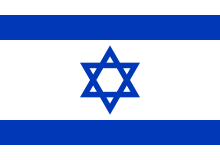 Israel, officially the State of Israel, is a country in the Southern Levant region of West Asia. It is bordered by Lebanon to the north, Syria to the northeast, Jordan to the east, the Red Sea to the south, Egypt to the southwest, the Mediterranean Sea to the west, and the Palestinian territories – the West Bank along the east and the Gaza Strip along the southwest. Tel Aviv is the financial, economic, and technological center of the country, while its seat of government is in its proclaimed capital of Jerusalem, although Israeli sovereignty over East Jerusalem is unrecognized internationally. Israel is located in a region known historically as Canaan, Palestine, and the Holy Land. In antiquity, it was home to several Canaanite, and later, Israelite and Judahite states, and is referred to as the Land of Israel in Jewish tradition. The region was successively conquered by the Assyrian, Babylonian, Achaemenid, Hellenistic, Roman and Byzantine empires, Arab Caliphates, Crusaders, Ayyubids, Mamluks and Ottomans. The late 19th century saw the rise of Zionism in Europe, a movement seeking a Jewish homeland, which garnered British support during World War I. During the war, the Ottomans were defeated and the British Mandate for Palestine was set up in 1920. Jewish immigration to Mandatory Palestine increased considerably, leading to intercommunal conflict between Jews and Arabs. The 1947 UN Partition Plan triggered a civil war between the two groups, which saw the expulsion and flight of most of Palestine's predominantly Arab population. (Full article...)Featured biographyAbū al-ʿAbbās Aḥmad ibn Ṭalḥa al-Muwaffaq (Arabic: أبو العباس أحمد بن طلحة الموفق), 853/4 or 860/1 – 5 April 902, better known by his regnal name al-Muʿtaḍid bi-llāh (Arabic: المعتضد بالله, "Seeking Support in God"), was the caliph of the Abbasid Caliphate from 892 until his death in 902. Al-Mu'tadid was the son of al-Muwaffaq, who was the regent and effective ruler of the Abbasid state during the reign of his brother, Caliph al-Mu'tamid. As a prince, the future al-Mu'tadid served under his father during various military campaigns, most notably in the suppression of the Zanj Rebellion, in which he played a major role. When al-Muwaffaq died in June 891 al-Mu'tadid succeeded him as regent. He quickly sidelined his cousin and heir-apparent al-Mufawwid; when al-Mu'tamid died in October 892, he succeeded to the throne. Like his father, al-Mu'tadid's power depended on his close relations with the army. These were first forged during the campaigns against the Zanj and were reinforced in later expeditions which the Caliph led in person: al-Mu'tadid would prove to be the most militarily active of all Abbasid caliphs. Through his energy and ability, he succeeded in restoring to the Abbasid state some of the power and provinces it had lost during the turmoil of the previous decades. (Full article...)General imagesThe following are images from various Asia-related articles on Wikipedia. Featured picture Credit: Jean-Marie Hullot A farmer harvests seaweed growing on a rope, on the small island of Nusa Lembongan, Indonesia. Wooden posts demarcate the bay into rectangular plots that are owned by different families. Seaweed farming is a fairly simple process: Attached plants are placed in the sea and allowed to grow naturally, with little human intervention.
Did you know...
Updated: 6:33, 14 February 2024 In the news
Related portalsMajor Religions in Asia Middle East Central Asia and Surroundings Indian Subcontinent Southeast Asia East Asia Selected panorama
The night skyline of Hong Kong, Victoria Harbour and Kowloon, as seen from Victoria Peak, the tallest mountain on Hong Kong Island. Hong Kong is located on China's south coast on the Pearl River Delta, and borders Guangdong province in the north and faces the South China Sea in the east, west and south. It has a population of 6.9 million people, and is one of the most densely populated areas in the world. TopicsCategoriesAssociated WikimediaThe following Wikimedia Foundation sister projects provide more on this subject:
More portalsShortcuts to this page: Asia portal • P:ASIA Purge server cache |

